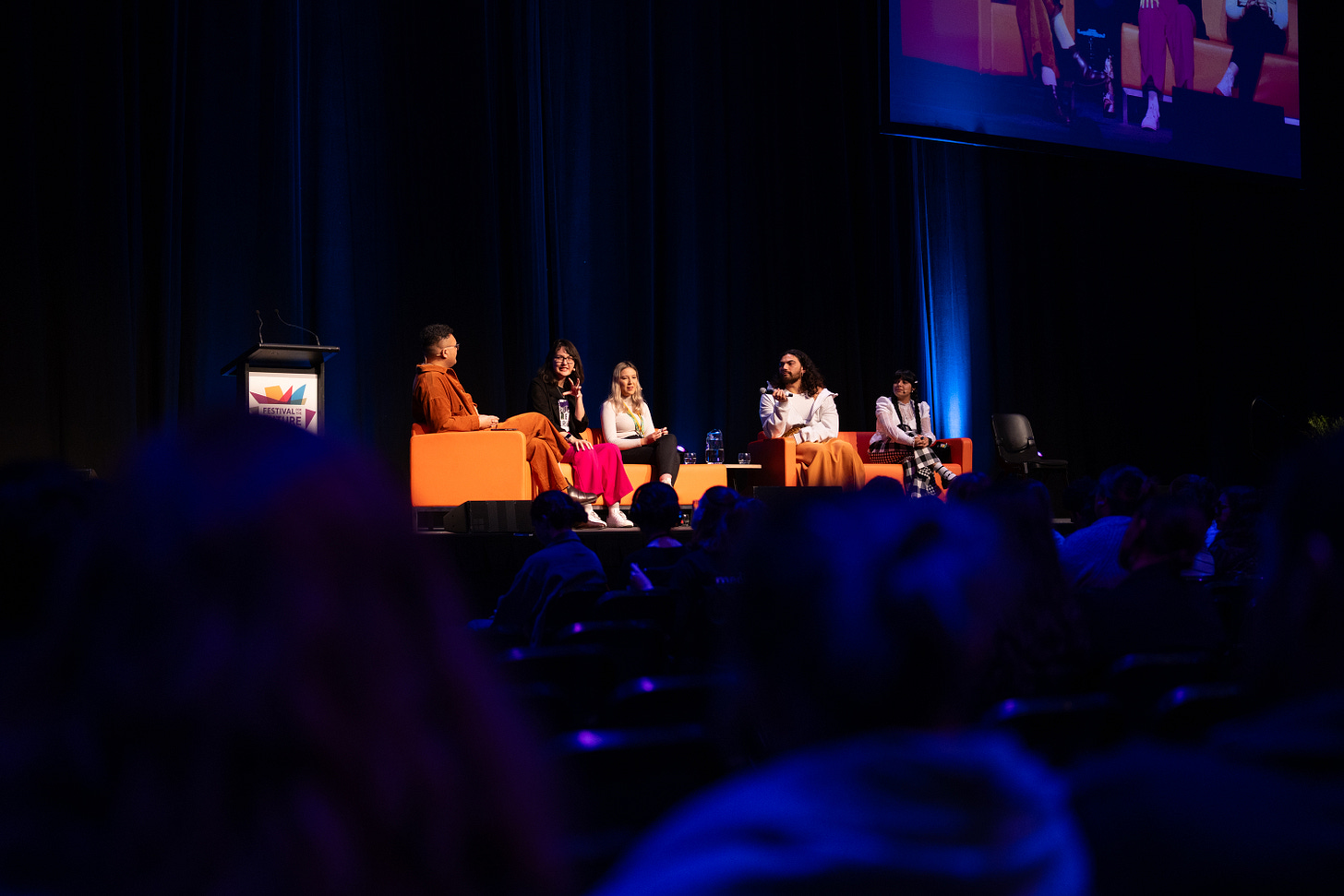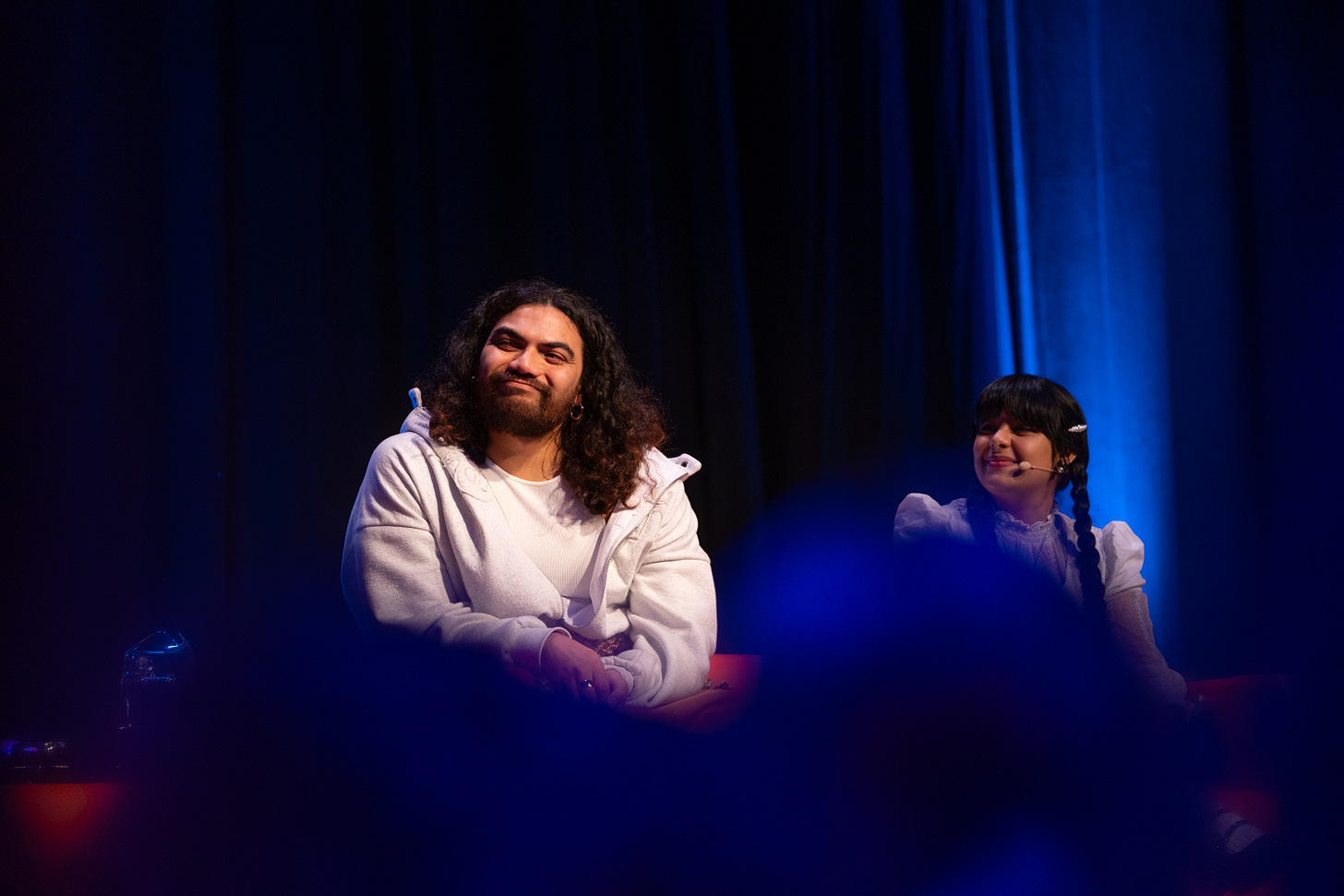Kasi Valu is in their ‘sunshine in the storm era,’ and it’s clear to see. Their aura, onstage as one of five amazing panellists speaking on nationality, identity, and belonging at Festival for the Future 2024 and in the corner of the echoing hallway where we sit, tired but bubbly, is pure sunshine and energy.
When I ask what ‘era’ he’s in – (there’s #bratsummer, #hotgirlsummer,) they pause. “Hashtag… sunshine in the storm,” they decide. “One thing I know about myself is that I refuse to lose hope and I’m always seeking the sunshine.”
This energy bursts from Kasi and is shared by many attending the Festival for the Future. We all know precisely the circumstances (nationally and globally) that we’re here under, but we’re all here because we hold hope and a certain ‘sunshine’ in our hearts, a yearning for a better future. Speakers throughout the event have reiterated this hope time and time again – conversations on the intersections of identity with the genocide in Gaza, on te Tiriti justice, on climate change, have been met with tears and a certain sobriety, but have also connected rooms full of people to the endless possibility for change to be made and hope to be held.
The panel Kasi has just finished speaking on, discussing identity and belonging, brought up an important point – people don’t want to sit and wallow in pity at their situations; they want to laugh through it. “It’s okay to cry about things,” Kasi smiles when I ask if he’d give his younger self any advice, “but when the tears end… have a fat laugh about it.” Recognising struggles and ongoing ‘storms’ in the world is vital to our understanding of each other, but the ability to create ‘sunshine’ in these spaces is critical to the health of our communities. This is the epitome of the ‘sunshine in the storm’ era Kasi and so many others at the festival seem to be living right now.
Often, finding your ‘sunshine’ (which comes up in many conversations at FFTF in the form of finding ‘peace’ or ‘energy’) can feel daunting, but anything that gives you energy can be a source of this ‘sunshine.’ Kasi cites Nicki Minaj as one source of their ‘sunshine,’ which seems to be in endless supply. We sing the lyrics to Superbass together and laugh about it. “This was literally my warm-up song.” While it might seem unserious at first, music and art have real power to change our hearts and spread joy. Kasi recognises this, too, as a source of ‘sunshine—’ not just for himself but for everyone. “I love, love, love the arts. Dance, poetry, writing, performance… it’s that galactical language that can connect every single person.”
Connection to others, whether through the ‘galactical language’ of the arts or other aspects of personal identity, is another way to find your ‘sunshine.’ The identity and belonging panel Kasi spoke on stressed the importance of community, with Kasi telling people who find themselves pushed to the fringes of society to cling to the community they find there. “We all have agency to take ownership and harness our superpowers, which are our differences,” Kasi says. Bringing diverse groups of people is a huge focus of Festival for the Future, and celebrating our ‘superpowers’ in this space feels poignant. It’s been two full days of cultivating community and connecting to new sources of ‘sunshine;’ Kasi’s sunshine-in-the-storm era is a beautiful summation of the festival.

While finding your community – either one you’re born into or discover later – is an overwhelmingly positive experience, certain intersections of our identities can cause internal conflict as we seek our ‘sunshine.’ Kasi acknowledges the guilt that we might feel when our sense of belonging shifts. “I come from a really big Tongan family, so I didn’t have to look far to seek that kind of village… But I realised that I was contorting who I knew myself to be to fit in with that massive community.” His advice to find (and even embody) the sunshine we all need in the storm is to let go. “Get rid of the guilt that you might be feeling. It takes a lot of courage to stand firm in taking ownership of your joy. A lot of the things I do in life when I’m seeking community are centered around finding your radical joy and following that, and everything else fits into a little puzzle.”
Finding joy, creating laughter, bringing the ‘sunshine:’ Kasi embodies it all. Somewhere in between our discussion of ‘sunshine in the storm,’ Kasi’s “immoveable” identity as a storyteller, and talking about art, Kasi offers to read us a poem. It’s witty and funny while holding a bitter edge and pointing out racism and political imbalances in our society. It’s everything we’ve said about ‘sunshine in the storm.’ It leaves us hopeful about the future that young artists, creatives, entrepreneurs, and innovators, like the rangatahi Festival for the Future has brought together, will create.
If you weren’t at Festival for the Future or haven’t found a community that brings out your ‘sunshine,’ if you’re ever blinded by the ‘storms’ that face our world, remember that you are not alone. Your ability to create joy and change is not reliant on other people; the right people will come to you as you lean into your ‘sunshine;’ as you begin to, as Kasi advises, “stand firm in taking ownership of your joy.”





